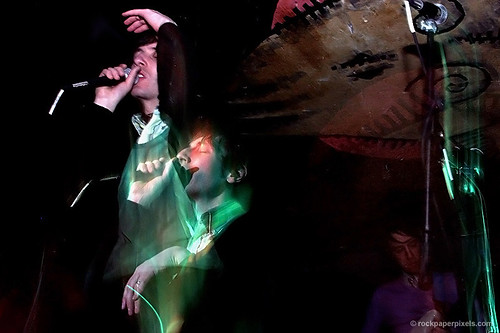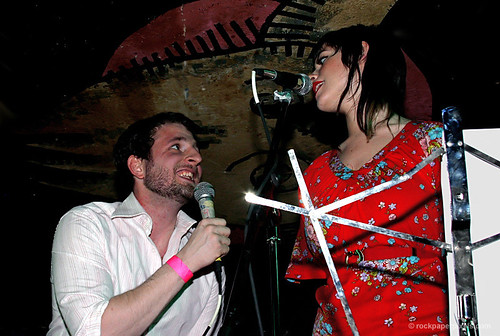I was fortunate enough to preview Pas/Cal's debut LP and interview keyboardist Richard Panic several weeks ago. The album will be titled I Was Raised on Matthew, Mark, Luke and Laura (not Citizen's Army Unifrom as previously reported,) and will be out early next year.
This is the most anticipated LP from a Detroit-based band in a good long time. It took long enough to complete: about three years. Some of us were wondering if it would ever get done and if the band would still be intact when it was finished. Not only did the wait prove to be worthwhile, but all fears have been put to rest.
I Was Raised on Matthew, Mark, Luke and Laura is an elaborate and extraordinary piece of work. For those expecting simply an extension of Pas/Cal's EP trilogy, this is not. It is a self-contained album, and somewhat of a departure from the Pas/Cal we're familar with. There are reworks of familiar songs, such as personal faves Little Red Radio and O Honey We're Ridiculous [which was never formally released until now, but a crowd pleaser at live shows,] along with unexpected conceptual works such as the "Cherry Suite." There are moments it gets too proggy for my taste - the overpowering production on The Glorious Ballad of the Ignored detracts from the crisp songwriting for example. Obsessive production, clever songwriting and charisma are Pas/Cal's main strengths, and they strike just the right balance the majority of the time. One of the finest exaples is Citizen's Army Uniform. The LP goes well beyond a synopsis of the band thus far: presenting a new, unexpectedly eclectic and solidly unified vision. If this doesn't make the decade's top 10 lists, the critics simply aren't paying enough attention. In the spirit of Pulp and The Smiths, it's a near perfect pop album: earworm infectious on first listen and still fascinating on the 100th listen.

behind the scenes stills from the "Summer Is Almost Here" music video
Without further ado, here is the interview:
Michael Doyle: The LP has been in the making for almost three years. I imagine that's had an impact on both the personal and creative dynamic of the band. How has the album evolved over that period of time? How does it compare to what you had in mind when you started it, and how do you and the rest of the band feel about it now?
Richard Panic: I don't think this album could have been recorded in less than a year even working full time on it. We were of course only able to squeeze it in after work and during the odd Saturday. Most of my parts were born out of exhaustion and while half dreaming at 2 am on a school night just trying to nail that perfect riff. For me, recording the album over the course of three years was therapeutic. I was able to spend late nights with Casimer and visit his family and kids. Sometimes we wouldn't get anything done musically but cemented a friendship. Some of the songs were recorded several times until they finally reached the product we have now. I think the more time we took the better the record became. The songs became more realized the way songs do with touring bands. We didn't spend any time on the road and we didn't spend much time rehearsing the album so the recording process was the only way for these songs to evolve. Normally a song writer will only fully realize what hes written after performing it many times. For Pas/Cal this was always happening during recording. So to answer the question, it is much better than when we started. I think the band has grown to love it and it is extremely excited to perform it.
Doyle: Some of my favorite things about reading the band's blog are the very technical and quirky narratives about the recording process. One favorite is the story about the Ace-Tone organ, and the trick of turning it off while holding down a key to get just the right sound. LIstening to the album, it's evident that every sound is carefully considered and has a story behind it. What are some of the more unusual techniques and/or happy accidents that occurred during the process?
Panic: Yes, that is also one of my favorite aspects of this record. The techniques employed on this record were far from normal. The piano was abused, punched, and smashed to get sounds out of it. Old Frankenstein, hand built, guitar amps, pianos trying to be guitars, guitars that want to be organs and more microphones than the state of the union address. One story off the top of my head is the studios Rhodes piano. Several keys had missing tines. As a result, I always had to reconsider my arraignments. This would always pose a challenge and end up creating melodies and harmonies I would have never came up with if not for the obstacles of the randomly missing notes. Also see the answer to the Cherry question below.
Casimer in Toronto [photo by Beth Hamill]
Doyle: In an interview once, Casimer talked about the contrast of PAS/CAL's upbeat, "sunny" music and often dark, morose lyrics - in the tradition of The Smiths and Blur. I'm quite drawn to and appreciate this kind of deception. It gives people who listen a little deeper something to appreciate - like they're in a secret club. Is this strictly an aesthetic choice, or a very deliberate one?
Panic: Before I joined this band, I was impressed by the lyrics. Obviously the Smiths were an influence but for me personally Morrissey is something of a religion. It was Smiths lyrics that enlightened and informed me in so many ways. So such a comparison coming from me is really saying something. Caz's writing was the closest anybody I had ever met came to being as inspired as Moz. His lyrical content and stories are different but the essence is there. I love the wit, sarcasm, and slightly skewed perspectives. I read somewhere once that the typical Morrissey fan is a self loathing egomaniac. I think that is true of Pas/Cal and yes it is quite deliberate.
Doyle: In the music as well as the lyrics, there are many layers - a lot going on that can only be appreciated by listening very closely. Yet at the same time, one could hear your music in the background at a bar and be inspired to... well, shake their ass a bit. It works in different ways in different environments. Was this a goal when creating it?
Panic: I think being from Detroit and all being about the same age delivered us into a special musical aesthetic space. It is the sum of the influences of all things Detroit. This city loves motown, hip hop, techno, and dirty rock n roll. This town knows how to party all night and this town has one of the tightest friendliest music scenes anywhere. Pas/Cal has a deep sense of rhythm which is very important to our songs. LTD is the most talented musician I know and brings the funky beats and the big bottom. Caz secretly or not so secretly wishes he could have just been RUN DMC so I think the dance element is just something we could not help avoid if we tried. Its the collision of everything we are and everything we wish we could be.
Panic and Betty in Toronto [photo by Beth Hamill]
Doyle: The band members come from a wide range of musical backgrounds - many from very experimental roots. How did you all decide to be part of a pop band? What were some of the motivations behind that, and how do you think your backgrounds carry over into this format?
Panic: I think in truth everyone in the band is the same. Everyone may have done other things but Pas/Cal was the answer to what everyone really wanted to do. I think its universal within Pas/Cal that our influences could just be listed as "all great music through out time". The band was formed through bonds of friendship and a similar love of music.
Doyle: You mentioned that the "Cherry Suite" was produced by different members of the band. How did that come about and what was the philosophy there?
Panic: The "Cherry Suite" was just an idea to see how a complete group song writing effort would turn out. Normally Casimer is the principal song writer but this time we did an experiment. The only thing that would link these songs would be the word Cherry and we took it from there. We split off into little groups and did our thing, Burgundy, Trevor and I recorded ours in my basement while Gene and Bem recorded theirs in Brooklyn. I am very happy with results and think each song reflects those particular peoples personalities. Two little recording secrets on the Cherry Tree song are as follows: a tin of Dean and Deluca grilling rub was used as our shaker and the bell was none other than a glass of Cabernet.
Doyle: I have to ask now, that release of the album is eminent, what are PAS/CAL's plans? More to the point, will there be a second album - or is it just too soon to ask?
Panic: Yes. there are already more songs written. I think the next album can be completed faster but we always say that. I really don't know what the future holds but everyone in the band has been writing songs lately for Pas/Cal and for other projects that are just blowing me away.
I Was Raised on Matthew, Mark, Luke and Laura will be released first quater of 2008 on Le Grand Magistery.
O Honey We're Ridiculous live at the Magic Stick video clip here.
Monday, November 26, 2007
Pas/Cal LP exclusive + Richard Panic Interview
Posted by:
Unknown
at
11/26/2007 04:00:00 AM
![]()
Subscribe to:
Post Comments (Atom)

No comments:
Post a Comment